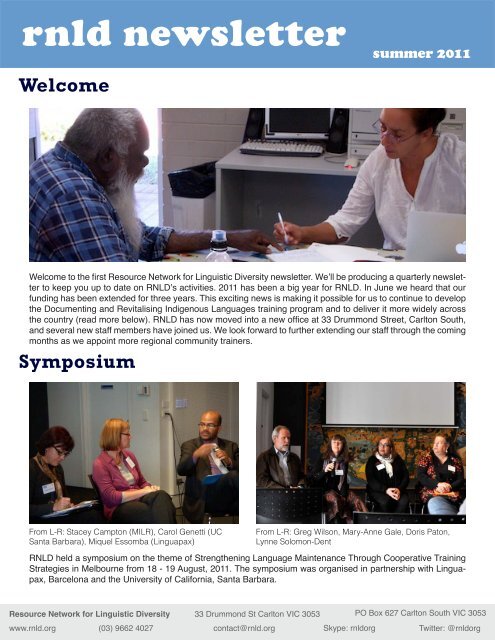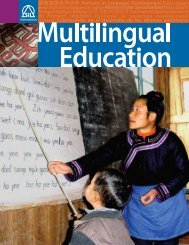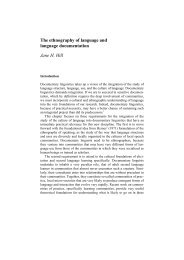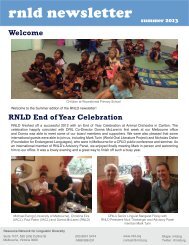Summer 2011 - RNLD
Summer 2011 - RNLD
Summer 2011 - RNLD
Create successful ePaper yourself
Turn your PDF publications into a flip-book with our unique Google optimized e-Paper software.
nld newsletter<br />
summer <strong>2011</strong><br />
Welcome<br />
Welcome to the first Resource Network for Linguistic Diversity newsletter. We’ll be producing a quarterly newsletter<br />
to keep you up to date on <strong>RNLD</strong>’s activities. <strong>2011</strong> has been a big year for <strong>RNLD</strong>. In June we heard that our<br />
funding has been extended for three years. This exciting news is making it possible for us to continue to develop<br />
the Documenting and Revitalising Indigenous Languages training program and to deliver it more widely across<br />
the country (read more below). <strong>RNLD</strong> has now moved into a new office at 33 Drummond Street, Carlton South,<br />
and several new staff members have joined us. We look forward to further extending our staff through the coming<br />
months as we appoint more regional community trainers.<br />
Symposium<br />
From L-R: Stacey Campton (MILR), Carol Genetti (UC<br />
Santa Barbara), Miquel Essomba (Linguapax)<br />
From L-R: Greg Wilson, Mary-Anne Gale, Doris Paton,<br />
Lynne Solomon-Dent<br />
<strong>RNLD</strong> held a symposium on the theme of Strengthening Language Maintenance Through Cooperative Training<br />
Strategies in Melbourne from 18 - 19 August, <strong>2011</strong>. The symposium was organised in partnership with Linguapax,<br />
Barcelona and the University of California, Santa Barbara.<br />
Resource Network for Linguistic Diversity 33 Drummond St Carlton VIC 3053 PO Box 627 Carlton South VIC 3053<br />
www.rnld.org<br />
(03) 9662 4027 contact@rnld.org<br />
Skype: rnldorg<br />
Twitter: @rnldorg
nld newsletter<br />
summer <strong>2011</strong><br />
Representatives from Indigenous organisations, networks, government agencies,<br />
research centres, and educational institutions gathered to learn about the diverse<br />
training programs for language documentation and revitalisation which are taking<br />
place across Australia and the Asia-Pacific region, and to discuss ways to strengthen<br />
cooperation and collaboration between programs.<br />
All presentations are publicly available on the symposium web site .<br />
Linguistics in the Pub<br />
Linguistics in the Pub (LIP) has now<br />
been running for two years, thanks<br />
to the efforts of Ruth Singer. Over<br />
this time, many topics have been<br />
discussed, ranging from how we<br />
can support language maintenance<br />
and revitalisation activities, to the<br />
benefits of collaboration between<br />
linguists and musicologists, to<br />
methods for documenting child<br />
Outreach<br />
October LIP meeting<br />
Jeanie Bell<br />
language. For a full list of past topics<br />
see To<br />
date, most LIP meetings have been<br />
held in Melbourne, however we<br />
encourage people in other locations<br />
to organise a local gathering<br />
around each topic. The December<br />
LIP, held in Canberra, discussed<br />
how to do this.<br />
<strong>RNLD</strong> continues to look for more ways to reach people in Australia and around the world who are concerned<br />
about maintaining Indigenous languages. Our email discussion list is now in its seventh year, and provides an<br />
active forum for members to ask questions and share information and expertise. The archived discussions are<br />
easily accessible on <strong>RNLD</strong>’s web site < www.rnld.org/DiscussionList>. Our Facebook group now boasts 455<br />
members, and we recently joined Twitter as @<strong>RNLD</strong>org.<br />
Linguist Knut Olawsky and <strong>RNLD</strong> regional community trainer<br />
Vicki Couzens welcoming the audience to the film evening<br />
Audience at Mirima Dawang Woorlab-gerring Language<br />
and Culture Centre film evening<br />
As part of our outreach activities, <strong>RNLD</strong> has begun organising film evenings in conjunction with our training<br />
workshops to encourage wider participation across all age groups in language activities. <strong>RNLD</strong> and Mirima<br />
Dawang Woorlab-gerring Language and Culture Centre recently co-hosted a free film evening in Kununurra.<br />
Resource Network for Linguistic Diversity 33 Drummond St Carlton VIC 3053 PO Box 627 Carlton South VIC 3053<br />
www.rnld.org<br />
(03) 9662 4027 contact@rnld.org<br />
Skype: rnldorg<br />
Twitter: @rnldorg
nld newsletter<br />
summer <strong>2011</strong><br />
Training activities<br />
The Documenting and Revitalising Indigenous Languages<br />
(DRIL) Program is a major strategy which<br />
has been created by <strong>RNLD</strong> to support the long-term<br />
maintenance of Australian Aboriginal languages. DRIL<br />
is a flexible, grassroots program designed for Aboriginal<br />
people who want to do their own language work to<br />
strengthen their language.<br />
Batchelor Institute linguist Jeanie Bell working with trainee<br />
Bianca Bond (Kabi Kabi) in Brisbane<br />
We run short, intensive on-site workshops which are<br />
designed around the specific interests and needs<br />
of each participant or group. So far, <strong>RNLD</strong> staff<br />
have undertaken eleven training workshops with<br />
members of fifteen language communities across five<br />
states and territories.<br />
<strong>RNLD</strong> regional community trainer Brad Steadman demonstrating<br />
the Jackal recorder to Elaine Olsen in Cobar.<br />
We currently offer 29 modules in this program,<br />
covering many aspects of language documentation<br />
and language revitalisation and maintenance activities.<br />
Mirima Dawang Woorlab-gerring language worker Glennis<br />
Galbat-Newry learning Miromaa<br />
Some workshops are undertaken with individuals or<br />
family groups. Others are organised in partnership with<br />
language centres, Indigenous organisations and educational<br />
institutions. In several locations, linguists who<br />
have worked on a language are sharing their expertise<br />
in workshops.<br />
Mirima Dawang Woorlab-gerring language worker Dwayne<br />
Newry demonstrating his work to Miriwoong elders in<br />
Kununurra, WA<br />
Resource Network for Linguistic Diversity 33 Drummond St Carlton VIC 3053 PO Box 627 Carlton South VIC 3053<br />
www.rnld.org<br />
(03) 9662 4027 contact@rnld.org<br />
Skype: rnldorg<br />
Twitter: @rnldorg
nld newsletter<br />
summer <strong>2011</strong><br />
Sharing Culture Director Gadj Maymuru digitising legacy<br />
Manggalili recordings<br />
Advocacy<br />
Wangka Maya language workers Esther Quintal and Nora<br />
Cooke learning recording techniques<br />
<strong>RNLD</strong> contributed a submission to the Inquiry into Language Learning in Indigenous Communities, which is being<br />
held by the House of Representatives Standing Committee on Aboriginal and Torres Strait Islander Affairs.<br />
To date, 137 submissions have been made to the Inquiry, covering many important themes.<br />
<strong>RNLD</strong> included the recommendations that:<br />
• Australia becomes a signatory to the UN Convention for the Safeguarding of the Intangible<br />
Cultural Heritage.<br />
• Recognition of Aboriginal and Torres Strait Islander languages be included in the preamble to the<br />
Australian Constitution.<br />
• Article 14 of the Declaration on the Rights of Indigenous Peoples be implemented and steps be<br />
taken to ensure that Indigenous children are offered an education in their own language.<br />
• the language nest model, including L2 classes for parents, be widely trialled in a range of environments<br />
and language scenarios across Australia.<br />
• the Master-Apprentice model be widely trialled in a range of environments and language<br />
scenarios across Australia.<br />
• the number of hours dedicated to language learning in L2 Indigenous language programs in<br />
schools be increased at least to parity with non-Indigenous LOTE programs in schools to ensure<br />
a realistic opportunity for language learning.<br />
• the Maintenance of Indigenous Languages and Records grant scheme be strengthened and<br />
substantially increased to offer a realistic possibility for the revitalisation and maintenance<br />
of Indigenous languages.<br />
Advisory panel meeting<br />
In August, <strong>RNLD</strong> held its first face-to-face meeting of our Advisory Panel. We now have six Australian and four<br />
international members of the Advisory Panel. They are Rob Amery (South Australia), Margaret Carew (Northern<br />
Territory), Kevin Lowe (New South Wales), Paul Paton (Victoria), Anne Poelina (Western Australia), Lesley<br />
Woods (Western Australia), Susie Bearune (New Caledonia), Toshihide Nakayama (Japan), Yusuf Sawaki (Indonesia),<br />
and Mark Turin (England).<br />
Resource Network for Linguistic Diversity 33 Drummond St Carlton VIC 3053 PO Box 627 Carlton South VIC 3053<br />
www.rnld.org<br />
(03) 9662 4027 contact@rnld.org<br />
Skype: rnldorg<br />
Twitter: @rnldorg
nld newsletter<br />
summer <strong>2011</strong><br />
Introducing our staff<br />
Margaret Florey - Co-Director and Senior Linguist<br />
Margaret is a co-founder of the Resource Network for Linguistic Diversity. She was awarded a PhD in Linguistics<br />
from the University of Hawai’i at Manoa in 1990. Margaret is an experienced field linguist with particular expertise<br />
in the endangered Austronesian languages of Central Maluku, eastern Indonesia, and Australian languages of<br />
the Pilbara region of Western Australia. Her work has been directed towards advocacy and capacity development<br />
activities with members of endangered language communities. Margaret manages <strong>RNLD</strong>’s activities and<br />
coordinates the Documenting and Revitalising Indigenous Languages training program.<br />
Nick Thieberger - Co-Director<br />
Nick is a co-founder of the Resource Network for Linguistic Diversity. He is an ARC QEII Fellow at the<br />
University of Melbourne. Nick recorded Paakantyi (NSW) speakers in the early 1980s and then worked with<br />
Warnman speakers (WA) when he was setting up the Wangka Maya language centre in Port Hedland. He built the<br />
Aboriginal Studies Electronic Data Archive (ASEDA) at AIATSIS in the early 1990. Nick was at the Vanuatu<br />
Cultural Centre from 1994-1997 and wrote a grammar of South Efate (central Vanuatu). In 2003 he helped<br />
establish the Pacific and Regional Archive for Digital Sources in Endangered Cultures (PARADISEC). Nick<br />
taught at the University of Hawai’i (2008-2010) and is the editor of the journal Language Documentation &<br />
Conservation. He is developing methods for creation of reusable data from fieldwork on previously unrecorded<br />
languages and training researchers in those methods.<br />
Regional Community Trainers<br />
This year, three Regional Community Trainers have been working with <strong>RNLD</strong> around the country in our Documenting<br />
and Revitalising Indigenous Languages training workshops. All the trainers came together at a DRIL<br />
workshop in Kununurra in March <strong>2011</strong>.<br />
Vicki Couzens (Victoria) co-trained at a DRIL workshop at Mirima Dawang Woorlab-gerring in October <strong>2011</strong>,<br />
and developed training materials for the DRIL program.<br />
Brad Steadman (NSW) is supporting the development of training workshops in western NSW.<br />
Lesley Woods (WA) organised and co-trained in several DRIL workshops in the Kimberley and Pilbara regions<br />
of Western Australia in 2010-<strong>2011</strong> covering ten languages. Lesley is also a member of <strong>RNLD</strong>’s Advisory Panel.<br />
Alison Soutar - Education Officer<br />
Alison is <strong>RNLD</strong>’s part-time Education Officer. She has been involved in language teaching and training in a variety<br />
of capacities for a number of years. Her most recent experience has been in Wellington, New Zealand, where<br />
she has been involved in community-based training programmes with refugee and migrant communities as well<br />
as co-ordinating training programmes in the health industry. Alison has also been involved in language training in<br />
Latin America and has several years experience co-ordinating educational tours and university credit courses to<br />
diverse countries throughout the world. Alison has a Bachelor of Arts (Linguistics) and a Postgraduate Diploma in<br />
Linguistics in Language Endangerment Studies from Monash University and is working towards a Certificate IV in<br />
Training and Assessment. She has a particular interest in community-based language documentation, revitalisation<br />
and maintenance programmes in Australia, New Zealand and the Pacific.<br />
Resource Network for Linguistic Diversity 33 Drummond St Carlton VIC 3053 PO Box 627 Carlton South VIC 3053<br />
www.rnld.org<br />
(03) 9662 4027 contact@rnld.org<br />
Skype: rnldorg<br />
Twitter: @rnldorg
nld newsletter<br />
summer <strong>2011</strong><br />
Felicity Houwen - Administrative Officer<br />
Felicity is <strong>RNLD</strong>’s part-time Administrative Officer and ensures the <strong>RNLD</strong> office is kept in order. She manages<br />
membership, organises <strong>RNLD</strong> events, and keeps <strong>RNLD</strong>’s website updated, including daily additions to the In<br />
The News section. Felicity is building <strong>RNLD</strong>’s social media profiles on Twitter and Facebook, is the Newsletter<br />
Editor, and writes occasional blog entries. She has a Bachelor of Arts (English) from the University of Western<br />
Australia, and is currently studying an Executive Master of Arts at the University of Melbourne.<br />
Lakmini Welaratne - Bookkeeper<br />
Lakmini Welaratne is <strong>RNLD</strong>’s part-time bookkeeper and manages the financial and HR side of the organisation.<br />
She has been involved in the finance industry for several years and is a registered CPA. She brings experience<br />
from a diverse range of organisations. Originally from Sri Lanka, she holds an Honours Degree in Finance from<br />
the University of Colombo.<br />
Eric Huang - IT Consultant<br />
Eric Huang is <strong>RNLD</strong>’s IT Consultant and manages <strong>RNLD</strong>’s website. He is a software engineer and an IT consultant.<br />
He works primarily with internet technologies, and specialises in web application development, data mining<br />
and text mining.<br />
Upcoming events<br />
12 - 14 December - Sustainable data from digital research: Humanities perspectives on digital<br />
scholarship, University of Melbourne, Australia<br />
20 December - <strong>RNLD</strong> End of Year Celebration, Upstairs room Prince Alfred Hotel, Carlton (see our Facebook<br />
group for details)<br />
6-8 January — World Language Meet and Chotro Four Imagining The Intangible: Languages,<br />
Literature and Visual Arts of the Indigenous, Vadodara, India<br />
Participate<br />
If you or your organisation would like to join <strong>RNLD</strong>’s training program please contact us.<br />
Join our email discussion list to ask questions and share information and your expertise.<br />
Join our Facebook group for recent articles and links to sites supporting endangered languages.<br />
Follow us on Twitter for news items, conference calls, updates on our activities and an online dialogue.<br />
Cover photo shows regional community trainer Lesley Woods working with Bruce Thomas in Port Hedland, WA.<br />
<strong>RNLD</strong> is funded under the Indigenous<br />
Languages Support program (formerly<br />
Maintenance of Indigenous Languages<br />
and Records).<br />
Applications for Indigenous Language<br />
Support Grants close on 3 February<br />
2012.<br />
www.arts.gov.au/indigenous/apply<br />
Resource Network for Linguistic Diversity 33 Drummond St Carlton VIC 3053 PO Box 627 Carlton South VIC 3053<br />
www.rnld.org<br />
(03) 9662 4027 contact@rnld.org<br />
Skype: rnldorg<br />
Twitter: @rnldorg





